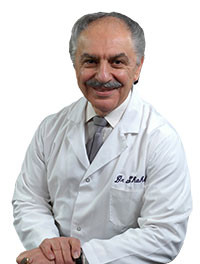Complex Regional Pain Syndrome Treatment in Midland Park, NJ

Complex regional pain syndrome (CRPS), also known as chronic regional pain syndrome and reflex sympathetic dystrophy (RSD), is a chronic pain condition that normally affects one region of the body—usually a single appendage like the arm, leg, hand or foot. Impacting as many as 200,000 people each year in the U.S. alone, CRPS can occur at any age in either sex.
CRPS usually develops following an injury and involves pain that continues six months or longer. CRPS involves a complex array of symptoms but it is characterized by an experience of pain that is out of proportion to the original causal injury.
If you experience chronic pain that impairs your quality of life, it is important to meet with a healthcare provider in Midland Park who can properly evaluate your symptoms and, if necessary, provide complex regional pain syndrome treatment. To schedule an appointment with a Midland Park pain management clinic, call (201) 806-6099 or contact Dr. M.T. Shahab online.
What Causes Complex Regional Pain Syndrome?
Malfunction of the central nervous system or peripheral nervous system—due to genetic abnormality or damage—is thought to be at the root of complex regional pain syndrome. Any damage or injury to the spinal cord, brain or nerves can result in CRPS. It is often seen following musculoskeletal injuries, nerve damage, surgery or a period of inactivity/immobilization. CRPS normally develops when the nervous system and/or the immune system malfunction in how they respond to healing tissue damage from trauma. The nerves—which are already abnormal or have been damaged—can misfire, sending a constant barrage of pain signals to the brain.
Complex regional pain syndrome is classified into two types:
- Complex Regional Pain Syndrome Type 1 (CRPS-I), is the diagnosis for patients who have no confirmed history of nerve damage. Formerly known as reflex sympathetic dystrophy syndrome, CRPS-I is the most common CRPS diagnosis.
- Complex Regional Pain Syndrome Type 2 (CRPS-II), formerly termed causalgia, is diagnosed when a confirmed nerve injury is associated with the disorder as a causal agent.
The presence of other inflammatory conditions—especially autoimmune diseases—can make the development of complex regional pain syndrome more likely. Whether immune dysfunction leads to CRPS or vice versa, there is a definite link between CRPS and immune function.
Complex Regional Pain Syndrome Symptoms and Diagnosis
Complex regional pain syndrome symptoms may include the following:
- Prolonged pain that continues six months or longer, after the injury has healed
- Excessive pain
- Radiating pain
- Burning sensation
- Sensation of “pins and needles”
- Changes in skin color, varying from white or bluish/purple skin, or alternatively, redness
- Swelling
- Changes in temperature of the skin
- Changes in skin texture
- Impaired muscle coordination
- Tremors, jerking or abnormal fixed posture or dystonia in the affected limb
- Abnormal sweating in the affected appendage
- Changes in hair growth patterns on the affected appendage
- Nail deformities when CRPS affects the hands or feet
- Joint stiffness
- Allodynia, a condition where normal or even slight touch can elicit an extreme pain response
CRPS symptoms can vary widely in severity. Some CRPS cases are mild and eventually dissipate, while some CRPS sufferers never recover and experience long-term disability. Pain management clinics see a high percentage of long-term CRPS sufferers who have exhausted other diagnosis and treatment options. CRPS, however, involves a more complex array of symptoms than the chronic pain which characterizes the condition.
There is currently no specific test to diagnose CRPS. Physical examination, medical history and a review of symptoms are key to properly diagnosing CRPS and ruling out other conditions which may present similarly. CRPS-I and CRPS-II present with similar symptoms. The distinguishing feature between the two is whether a causal injury can be identified.
Complex Regional Pain Syndrome Treatment
A wide range of therapies is often utilized in the treatment of complex regional pain syndrome. Early diagnosis and treatment usually lead to the most successful outcomes. Treatment protocols for CRPS-I and CRPS-II are usually identical, with the exception being that CRPS-II treatment may sometimes involve treatment of the causal injury if necessary. Although treatment varies, your healthcare provider may recommend:
- Oral medications, including NSAIDs, corticosteroids, gabapentin or Neurontin (and other drugs originally developed for seizure and now used for nerve pain), BOTOX® injections, opiate pain relievers, and NMDA receptor agonists like ketamine
- Physical therapy, including rehabilitation exercises to keep blood flowing to the affected region
- Psychotherapy to ease the impact of chronic pain and cope with pain, as well as behavioral modification therapy to assist with perceptions of pain
- Topical anesthetic patches or creams
- Surgical options such as sympathetic nerve block and surgical sympathectomy
- Spinal cord stimulation (neurostimulation anywhere along the pain pathway)
- Intravenous immunoglobulin (IVIG)
- Graded motor imagery therapy involving imaging exercises
- Acupuncture
- Relaxation techniques
- Biofeedback therapy
- Chiropractic treatments
Complex regional pain syndrome is most often successfully resolved if diagnosed and treated early. Request more information about CRPS and your treatment options today. Call (201) 806-6099 or contact Dr. M.T. Shahab online.
Medwell Orthopedics & Functional Medicine for Men & Women
Address
33 Central AveMidland Park, NJ 07432
(201) 806-6099
www.BergenCountyDoctors.com
Hours
Mon:
8:00 am - 8:00 pm
Tue:
2:00 pm - 7:00 pm
Wed:
8:00 am - 6:30 pm
Thu:
8:00 am - 1:00 pm
Fri:
8:00 am - 6:30 pm
Sat:
9:00 am - 1:00 pm
Sun:
By Appointment Only


